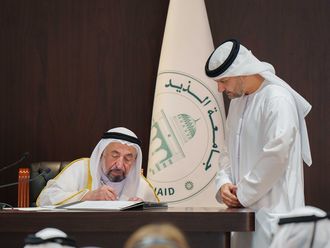Dubai: The Knowledge and Human Development Authority (KHDA), encourages Dubai private schools to adopt external assessments and introduce critical thinking in classes to help them meet the UAE’s National Agenda goals in 2021.
Around 160 principals from private schools across Dubai gathered on Tuesday at a KHDA event in Dubai to discuss how they can meet the country’s education goals, especially those related to the UAE’s ranking in international assessment tests.
His Highness Shaikh Mohammad Bin Rashid Al Maktoum, Vice-President and Prime Minister of the UAE and Ruler of Dubai, put forward two main objectives regarding the UAE’s ranking in international assessments:
The UAE will be among the 15 highest performing countries in Timss (Trends in International Mathematics and Science Study).
The UAE will be among the 20 highest performing countries in Pisa (Programme for International Student Assessment).
Meeting these rankings by 2021 is an ambitious goal for UAE schools that are currently ranked below the international average of 500. To fulfil the national agenda goals the students must rank 520 in all the subjects of the Pisa exams. While to fulfil the UAE national agenda, grade eight students must score 510 and grade four students must score 530 in Timms.
Dr Abdullah Al Karam, Director General of KHDA, said in the past few years, the KHDA worked with Dubai’s private schools to look at teaching and learning practices and identify the actions that must be taken to improve.
“To improve further, now’s the time to start looking at the practices of schools outside of Dubai. Research in wellbeing and education has taught us that happier school communities will lead to happier students and improved outcomes, and we believe it is this which will help us to reach the 2021 National Agenda targets,” he said.
Dr Rabaa Al Sumaiti, Director of International Assessment at the KHDA said the authority believes that implementing external assessments will help schools ultimately reach the national agenda goals.
She said to meet individual objectives, schools should adopt benchmarks to get earlier feedback on their students’ performance because it will take 2 years to get the results of the previous international examination.
“Schools should utilise international assessment reports to improve teaching, learning, and curriculum adaption, provide teachers with appropriate professional development to help improve their ability to better teach problem-solving and critical thinking skills and improve students literacy skills to allow better progress in math and science.”
David Hicks, Principal of Emirates International school Jumeirah said in addition to the international assessments, schools should not forget other national agenda goals such as improving Arabic attainment.
Hicks said to fulfil the agenda goals, schools can seek continued feedback from the KHDA, have more awareness about the national goals and focus on building partnerships.
“Schools should also focus more on their weaker areas, sharing common strategies and having locally driven standardised assessments.”
Principals at the KHDA event were confident of their student’s capabilities. CEO and principal of Westminster school, Kingston Gilbert said his school has already performed above average in previous international assessment tests.
“The most important aspect that helped us to come on top is promoting self-organised learning where children have a say in what they are taught,” he said.
Principal of the American School of Dubai, Dr Brent Mutsch, said: “It’s the first time for us took the international tests and we are anxious to get the results back and analyse them. We want to see what our weaknesses and strength.”












